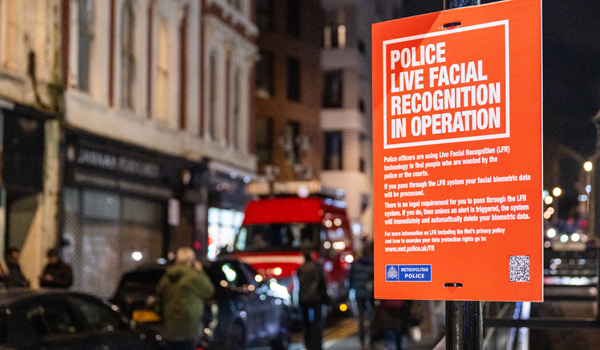Report calls for national police LFR coordination capability
A new report has called for a national coordination capability for police use of live facial recognition (LFR).
Released on Wednesday (October 15) by the policing, security and justice consultancy Leapwise Advisory, the report, ‘Live Facial Recognition: The Case for Coordinated National Expansion’, draws on exclusive analysis of LFR deployment data from all forces across England and Wales up until September 26 this year.
It found that police have deployed LFR 613 times since 2015 across ten forces – with 463 (76 per cent) of total deployments taking place in 2024 and 2025 alone
Since 2015, police LFR deployments have scanned 13.3 million citizens’ faces – with 10.3 million (77 per cent) taking place in 2024 and 2025 alone
Forces have taken enforcement action (arrests, cautions and other action) 2,655 times following LFR alerts, including 1,343 arrests by the Metropolitan Police Service (MPS) alone. This year is now the second year running in which LFR has resulted in enforcement action more than 1,000 times in a calendar year.
The report found accuracy has also “drastically improved” – while false LFR alerts outmatched true ones in 2017, 2018, 2019 and 2020, there have been more true alerts than false ones in every year since 2022.
There were 1,408 true alerts from police LFR systems, compared with 28 false ones, in 2024 and 1,898 true alerts with just 13 false ones in 2025.
LFR use by the MPS at Notting Hill Carnival also shows improving effectiveness. In 2016, LFR created one alert (which was false) and in 2017, it created 96 alerts (95 were false.) In deployments at the 2025 Carnival, 96 of the 98 alerts created were accurate ones.
With LFR set to grow nationally, after the Home Office funded ten new LFR vans spread across seven police forces, the paper recommends:
- A new national LFR coordination capability headed by a new full-time national leader for police LFR and biometrics – with responsibility for procuring LFR, testing algorithms, directing next-stage R&D, and setting best practice in the use of this technology;
- Stronger national direction around how LFR can be deployed in individual forces – with a national centre that establishes broad requirements (such as mandatory training) and specific constraints (such as auto-deletion of data from ‘not wanted’ individuals) that all police forces must follow; and
- A new, single legal framework for police use of biometrics such as LFR in line with Home Office plans. This could provide clarity to the complex legal-regulatory environment around LFR.
MPS Commissioner Sir Mark Rowley, writing in the paper’s foreword, said: “Our investment in cutting-edge technology is making us more capable, more productive, and more focused. Nowhere is this more evident than in our pioneering use of LFR. Put simply, it’s a game-changer. And it’s one that is helping us bear down on crime in the capital.
“But as LFR is rolled out to more forces across England and Wales, we must ensure that its use is consistent and effective everywhere. That means moving beyond local innovation to a national model of coordination. This is why I support police reform that enables the proper, once-and-for-all rollout of technology like LFR.
“Reform is not just about new tools – it is about building the infrastructure, clarity, and professional standards that allow technology to strengthen, magnify, and enable what our determined, compassionate, and often heroic officers do for our communities.”
Leapwise senior consultant James Sweetland, the report author, said: “Police practice around LFR has improved dramatically since it was first used a decade ago. It is now an exceptionally effective tool which, when used with the right safeguards and appropriate constraints, can help police forces locate wanted people (from criminal offenders to missing persons) and build trust and confidence.”
“The Home Office rollout of ten LFR vans means that more forces than ever now have access to this technology.
“However, this defining moment comes with risk. New forces are inexperienced LFR users and poor practice could harm public support. That’s why a national coordination capability is essential to ensure effective and appropriate use of these tools across all forces in England and Wales.”


